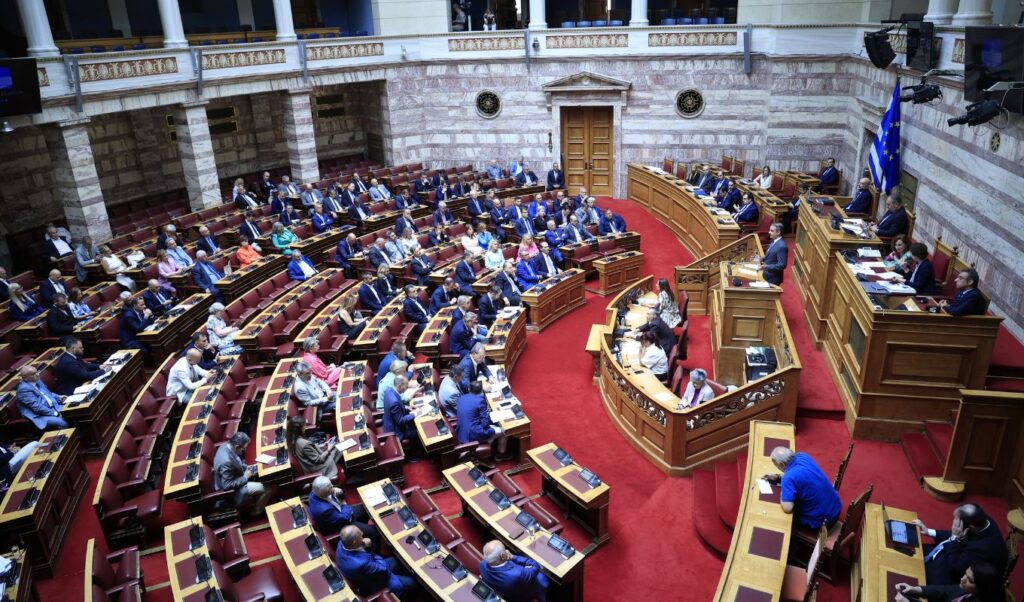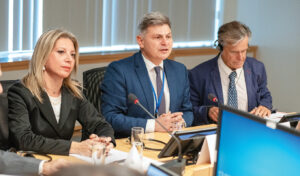The government’s decision to proceed with establishing an investigative committee for the OPEKEPE scandal is causing new tensions between the majority and opposition, while parliamentary observers estimate that the parliamentary debate will take place in the first week of August, during which the preliminary inquiry proposals to be submitted by PASOK and possibly SYRIZA will be rejected.
Read: New Democracy proposes investigative committee for OPEKEPE, covering period from 1998 to present
According to statements made earlier during the government briefing by Pavlos Marinakis, the reason the government is resorting to an investigative committee is that the evidence does not reveal elements pointing to criminal offenses by Makis Voridis and Lefteris Avgenakis. Thus, it was decided to establish an investigative committee that will be called upon to investigate the period from the organization’s founding in 1998 until today, with the government sending the message that all pathologies will be investigated, aiming for purification and transparency in the livestock sector. Indeed, government sources mentioned that relevant initiatives will be undertaken in the coming days. As everything indicates, the investigative committee’s work will likely run from early September, while audits to identify illegal subsidies and money recovery will be ongoing simultaneously.
OPEKEPE: Opposition reactions to New Democracy’s proposal
Meanwhile, opposition parties launched attacks against the government regarding the decision to propose an investigative committee. PASOK, through its press spokesperson Kostas Tsoukalas, notes that “Mr. Mitsotakis is not only the Prime Minister of ‘we failed,’ but also of ‘we continuously cover up,'” while SYRIZA, through Kostas Zachariadis, emphasizes that “once again New Democracy bypasses justice while there is a case file in Parliament.”
New Left states that “the investigative committee proposal could have been a joke, but it’s a provocation,” and KKE says: “the non-establishment of a preliminary inquiry would constitute an evasion and attempted cover-up of responsibilities by New Democracy.”
Greek Solution ironically mentions that “New Democracy’s proposal might open discussion for retrying Kolokotronis’s case,” while Movement for Change speaks of a cover-up.
PASOK submits preliminary inquiry proposal – SYRIZA publicizes its proposal
Meanwhile, PASOK will submit by Wednesday – after a party parliamentary group meeting – its proposal for establishing a preliminary inquiry that will target former Ministers of Agricultural Development and Food, Makis Voridis and Lefteris Avgenakis, based on the European prosecutor’s case file. Simultaneously, SYRIZA will publicize its own proposal and await four more MPs to co-sign it for introduction to plenary discussion.
What is the difference between investigative and preliminary inquiry committees
It should be noted that the Greek Parliament has two important institutional tools for investigating cases that concern public opinion and involve potential criminal responsibilities of political figures: the investigative committee and the preliminary inquiry committee. Each has different missions, competencies, and legal consequences.
Investigative committee
This is a body established by Parliament called upon to investigate matters of general interest concerning public administration functioning, economy, political life, or other serious issues. Its establishment follows a Parliament decision made “by simple majority of present MPs, which cannot be less than two-fifths of all MPs (120 MPs), after a proposal by one-fifth (30) of all MPs,” according to Article 68 of the Constitution.
The proposal can be submitted by either the government or opposition. The committee can: a) collect evidence and documents from public services, b) call witnesses for testimony, c) examine public officials and involved persons, d) draft a report that may include political or institutional proposals.
Its report does not entail legal consequences for involved persons. In Greek political history, 25 have been established, investigating everything from the Cyprus File and Koskotas scandal to Armed Forces procurement, the Vatopedi case, structured bonds, the 2009 deficit, party and media lending, wiretapping, and contract 717.
Its role is to conduct prosecutorial investigation, meaning it has competencies that investigative authorities and misdemeanor prosecutors have, investigating the case comprehensively rather than specific criminal responsibilities. Usually, reports assign political responsibilities, and if sufficient evidence for criminal responsibilities is found, Parliament is asked to establish a preliminary inquiry committee.
Preliminary inquiry committee
Meanwhile, the preliminary inquiry or Special Parliamentary Committee for Conducting Preliminary Examination has a significantly more important role, as it can lead to criminal prosecution of political figures. The preliminary inquiry investigates specific criminal responsibilities listed in the text by MPs submitting the establishment proposal.
The preliminary inquiry has the role and competencies of a prosecutor and can even order forcible witness summoning. It can also initiate prosecutions, which investigative committees cannot do. According to Article 68 of the Constitution, only Parliament has the competency to prosecute current or former government members or deputy ministers for criminal offenses committed while exercising their duties, as the law defines.
Its establishment requires absolute majority (at least 151 MPs), after a proposal signed by at least 30 MPs and is activated when strong evidence exists that ministers, deputy ministers, or even the prime minister have committed criminal offenses while exercising their duties.
It functions almost like a prosecutorial body and can: a) call witnesses and suspects for testimony, b) collect evidence, c) propose criminal prosecutions, d) decide if the case will be referred to the Judicial Council and possibly to the Special Court.
Unlike investigative committees, preliminary inquiries have legal consequences, as they can lead to referring political figures to Justice. But this is also conditional. Specifically, the committee’s report is introduced to Parliament’s plenary, which decides whether to prosecute or not. Therefore, the party with more than half the MPs (in this case, New Democracy with 156 MPs) can block a prosecution or give the “green light” for prosecutions against specific individuals.




